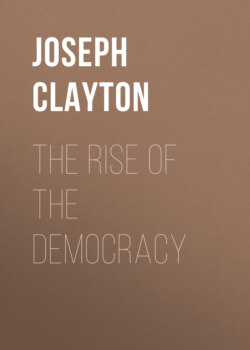Читать книгу The Rise of the Democracy - Joseph Clayton - Страница 18
На сайте Литреса книга снята с продажи.
The Foundations of Democracy
ОглавлениеA steady and invincible belief that those who maintain the defence of the country and pay for the cost of government should have a voice in the great council of the nation, and the conviction that effective utterance can be found for that voice in duly chosen representatives, are the foundations on which democracy has built. Democracy itself comes in (1) when it is seen that all are being taxed for national purposes; and (2) the opinion finds acceptance that responsibilities of citizenship should be borne by all who have reached the age of manhood and are of sound mind.
To sketch the rise of democracy in England is to trace the steady resistance to kings who would govern without the advice of counsellors, and to note the growing determination that these counsellors must be elected representatives. Only when the absolutism of the Crown is ended and a Parliament of elected members has become the real centre of government, is it possible, without a revolution, for democracy to be established.
Much of this book is given up, then, to the old stories of kingly rule checked and slowly superseded by aristocracy. And all the old attempts at revolution by popular insurrection are again retold, not only because of the witness they bear to the impossibility in England of achieving democracy by the violent overthrow of government, but because they also bear witness to the heroic resolution of the English people to take up arms and plunge into a sea of troubles rather than bear patiently ills that were unseemly for men to endure in silence. Popular insurrection failed, but over and over again violence has been resorted to in the resistance to tyranny, and has been justified by its victory. If Wat Tyler, Jack Cade, and Robert Ket are known as beaten revolutionaries, Stephen Langton, Simon of Montfort, and John Hampden are acclaimed as patriots for not disdaining the use of armed resistance.
The conclusion is that a democratic revolution was not to be accomplished in England by a rising of the people, but that forcible resistance even to the point of civil war was necessary to guard liberties already won, or to save the land from gross misgovernment. But always the forcible resistance, when successful, has been made not by revolutionaries but by the strong champions of constitutional government. The fruit of the resistance to John was the Great Charter; of Simon of Montfort's war against Henry III., the beginning of a representative Parliament; of the war against Charles, the establishment of Parliamentary government. Lilburne and his friends hoped that the civil war and the abolition of monarchy would bring in democracy, though democracy was never in the mind of men like Hampden, who made the war, and was utterly uncongenial to Cromwell and the Commonwealth men. But the sanctity of monarchy received its death-blow from Cromwell, and perished with the deposing of James II.; and there has been no resurrection. To the Whig rule we owe the transference of political power from the Crown to Parliament. Once it is manifest that Parliament is the instrument of authority, that the Prime Minister and his colleagues rule only by the permission and with the approval of the House of Commons, and that the House of Commons itself is chosen by a certain number of electors to represent the nation, then it is plain that the real sovereignty is in the electors who choose the House of Commons. As long as the electors are few and consist of the great landowners and their satellites, then the constitutional government is aristocracy, and democracy is still to come.
And just as discontent with monarchy, and its obvious failure as a satisfactory form of government, brought in aristocracy, so at the beginning of the nineteenth century discontent with aristocracy was rife, and a new industrial middle-class looked for "Parliamentary reform," to improve the condition of England.
